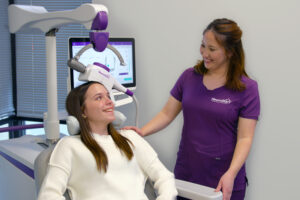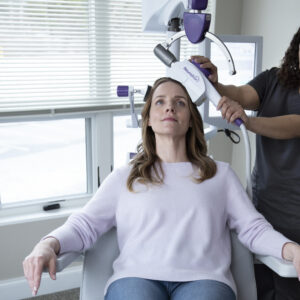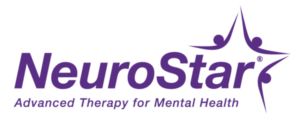Brainsway Deep TMS in Fort Wayne can be an ideal treatment for both adults with MDD, anxious depression, or OCD and adolescents aged 15+ with MDD.
Here, we will cover an overview of some of the most important details about this treatment. For more information—and personalized guidance—schedule your consultation with our mental health specialists at Viking Psychiatry. Discover how Brainsway Deep TMS can help you take charge of your mental health.
Transcranial Magnetic Stimulation (TMS) is a treatment for MDD, anxious depression, and OCD that utilizes targeted, magnetic pulses to activate lower-functioning brain regions that regulate mood, behavior, and emotion.
With this approach, Brainsway Deep TMS can help your brain function more effectively over time, which can alleviate your mental health symptoms—without the side effects of medication, or the invasiveness of surgery.
Brainsway Deep TMS is one of the leading TMS therapies available. It can offer many benefits, including:
NeuroStar is for adult patients with major depressive disorder (clinical depression), with or without comorbid anxiety and/or obsessive-compulsive disorder (OCD). It can also be suitable for qualifying adolescent patients over the age of 15 with clinical depression. Discover whether Brainsway Deep TMS is right for you during a consultation with our team at Viking Psychiatry in Fort Wayne, Indiana.

NeuroStar delivers proven results for individuals seeking relief from depression and anxious depression. Backed by extensive research and real-world outcomes, it has become a trusted solution for those struggling with their mental health, with over 6.9 million treatments performed on over 188,000 patients.
According to a real world study, 83% of patients who completed their NeuroStar treatment cycle experienced measurable improvement in their symptoms. Additionally, 62% achieved complete remission, meaning they would no longer meet the criteria for a major depressive disorder (MDD) diagnosis if newly evaluated.**
Unlike traditional approaches that often lose effectiveness over time, such as medication, NeuroStar provides a reliable path to relief. The likelihood of remission increases with each session. **
With results like this, Fort Wayne men and women who are struggling with MDD, anxious depression, or OCD should consider Brainsway Deep TMS as a part of their journey to wellness.
Yes, NeuroStar is covered by most insurance—in fact, approximately 300 million Americans are eligible for NeuroStar insurance coverage.
NeuroStar is covered by major health insurance providers, such as Medicare, Medicaid, and TRICARE. However, be aware that your insurance coverage will depend on your provider and your policy. Most insurers have eligibility criteria that must be met. Typically, to be eligible for NeuroStar insurance coverage, you need to have tried and failed two to four medications before pursuing NeuroStar treatment. These criteria are dependent on your plan and your insurance provider.
Other financial options may be available for qualifying patients in addition to or instead of medical insurance coverage. At Viking Psychiatry, we do not want you to feel overwhelmed by your mental health treatment. If you need assistance navigating your insurance coverage for Brainsway Deep TMS, our Fort Wayne team can help you discover your options for financial support.

For most Fort Wayne patients, Brainsway Deep TMS is well tolerated. You can even relax during your treatment by listening to music or scrolling on your phone. During the first few sessions, some patients may experience mild discomfort at or near the treatment site. This is typically manageable with over-the-counter medication, and most people adjust to the sensation within one to two weeks. Other possible side effects include headaches or a tingling sensation on the scalp.
At Viking Psychiatry, we proudly offer Brainsway Deep TMS in Fort Wayne for qualifying patients with symptoms of depression, anxious depression, and OCD. NeuroStar TMS is renowned by clinical specialists for its effectiveness and non-invasive approach, and it is the #1 physician-recommended treatment of its kind.
Our experienced and compassionate team is here to guide you through the NeuroStar treatment process and answer any questions you may have. Your journey to feeling better starts with us, and we look forward to supporting you every step of the way. Reach out today to learn more.
**Outcomes Registry data was published by Sackeim HA, et al. J Affective Disorders, 2020, 277(12):65-74. The outcomes reported represent the subset of study patients for which the CGI-S data was reported before and after an acute course of NeuroStar TMS. Patients were treated under real-world conditions where patients may have been prescribed concomitant depression treatments including medications. “Measurable relief” was defined as a CGI-S score <=3 and “complete remission” was defined as a CGI-S score <=2 at the end of treatment.
Adult Indications for Use
The NeuroStar Advanced Therapy System is indicated for the treatment of depressive episodes and for decreasing anxiety symptoms for those who may exhibit comorbid anxiety symptoms in adult patients suffering from Major Depressive Disorder (MDD) and who failed to achieve satisfactory improvement from previous antidepressant medication treatment in the current episode.
The NeuroStar Advanced Therapy System is intended to be used as an adjunct for the treatment of adult patients suffering from Obsessive Compulsive Disorder (OCD).
Adolescent Indications for Use
NeuroStar Advanced Therapy is indicated as an adjunct for the treatment of Major Depressive Disorder (MDD) in adolescent patients (15-21).
Important Safety Information
NeuroStar Advanced Therapy is only available by prescription. A doctor can help decide if NeuroStar Advanced Therapy is right for you. Patients’ results may vary.
The most common side effect is pain or discomfort at or near the treatment site. These events are transient; they occur during the TMS treatment course and do not occur for most patients after the first week of treatment. There is a rare risk of seizure associated with the use of TMS therapy (<0.1% per patient).

Brainsway Deep TMS in Fort Wayne can be an ideal treatment for both adults with MDD, anxious depression, or OCD and adolescents aged 15+ with MDD.
Here, we will cover an overview of some of the most important details about this treatment. For more information—and personalized guidance—schedule your consultation with our mental health specialists at Viking Psychiatry. Discover how Brainsway Deep TMS can help you take charge of your mental health.
Transcranial Magnetic Stimulation (TMS) is a treatment for MDD, anxious depression, and OCD that utilizes targeted, magnetic pulses to activate lower-functioning brain regions that regulate mood, behavior, and emotion.
With this approach, Brainsway Deep TMS can help your brain function more effectively over time, which can alleviate your mental health symptoms—without the side effects of medication, or the invasiveness of surgery.
Brainsway Deep TMS is one of the leading TMS therapies available. It can offer many benefits, including:
NeuroStar is for adult patients with major depressive disorder (clinical depression), with or without comorbid anxiety and/or obsessive-compulsive disorder (OCD). It can also be suitable for qualifying adolescent patients over the age of 15 with clinical depression. Discover whether Brainsway Deep TMS is right for you during a consultation with our team at Viking Psychiatry in Fort Wayne, Indiana.

NeuroStar delivers proven results for individuals seeking relief from depression and anxious depression. Backed by extensive research and real-world outcomes, it has become a trusted solution for those struggling with their mental health, with over 6.9 million treatments performed on over 188,000 patients.
According to a real world study, 83% of patients who completed their NeuroStar treatment cycle experienced measurable improvement in their symptoms. Additionally, 62% achieved complete remission, meaning they would no longer meet the criteria for a major depressive disorder (MDD) diagnosis if newly evaluated.**
Unlike traditional approaches that often lose effectiveness over time, such as medication, NeuroStar provides a reliable path to relief. The likelihood of remission increases with each session. **
With results like this, Fort Wayne men and women who are struggling with MDD, anxious depression, or OCD should consider Brainsway Deep TMS as a part of their journey to wellness.
Yes, NeuroStar is covered by most insurance—in fact, approximately 300 million Americans are eligible for NeuroStar insurance coverage.
NeuroStar is covered by major health insurance providers, such as Medicare, Medicaid, and TRICARE. However, be aware that your insurance coverage will depend on your provider and your policy. Most insurers have eligibility criteria that must be met. Typically, to be eligible for NeuroStar insurance coverage, you need to have tried and failed two to four medications before pursuing NeuroStar treatment. These criteria are dependent on your plan and your insurance provider.
Other financial options may be available for qualifying patients in addition to or instead of medical insurance coverage. At Viking Psychiatry, we do not want you to feel overwhelmed by your mental health treatment. If you need assistance navigating your insurance coverage for Brainsway Deep TMS, our Fort Wayne team can help you discover your options for financial support.

For most Fort Wayne patients, Brainsway Deep TMS is well tolerated. You can even relax during your treatment by listening to music or scrolling on your phone. During the first few sessions, some patients may experience mild discomfort at or near the treatment site. This is typically manageable with over-the-counter medication, and most people adjust to the sensation within one to two weeks. Other possible side effects include headaches or a tingling sensation on the scalp.
At Viking Psychiatry, we proudly offer Brainsway Deep TMS in Fort Wayne for qualifying patients with symptoms of depression, anxious depression, and OCD. NeuroStar TMS is renowned by clinical specialists for its effectiveness and non-invasive approach, and it is the #1 physician-recommended treatment of its kind.
Our experienced and compassionate team is here to guide you through the NeuroStar treatment process and answer any questions you may have. Your journey to feeling better starts with us, and we look forward to supporting you every step of the way. Reach out today to learn more.
**Outcomes Registry data was published by Sackeim HA, et al. J Affective Disorders, 2020, 277(12):65-74. The outcomes reported represent the subset of study patients for which the CGI-S data was reported before and after an acute course of NeuroStar TMS. Patients were treated under real-world conditions where patients may have been prescribed concomitant depression treatments including medications. “Measurable relief” was defined as a CGI-S score <=3 and “complete remission” was defined as a CGI-S score <=2 at the end of treatment.
Adult Indications for Use
The NeuroStar Advanced Therapy System is indicated for the treatment of depressive episodes and for decreasing anxiety symptoms for those who may exhibit comorbid anxiety symptoms in adult patients suffering from Major Depressive Disorder (MDD) and who failed to achieve satisfactory improvement from previous antidepressant medication treatment in the current episode.
The NeuroStar Advanced Therapy System is intended to be used as an adjunct for the treatment of adult patients suffering from Obsessive Compulsive Disorder (OCD).
Adolescent Indications for Use
NeuroStar Advanced Therapy is indicated as an adjunct for the treatment of Major Depressive Disorder (MDD) in adolescent patients (15-21).
Important Safety Information
NeuroStar Advanced Therapy is only available by prescription. A doctor can help decide if NeuroStar Advanced Therapy is right for you. Patients’ results may vary.
The most common side effect is pain or discomfort at or near the treatment site. These events are transient; they occur during the TMS treatment course and do not occur for most patients after the first week of treatment. There is a rare risk of seizure associated with the use of TMS therapy (<0.1% per patient).